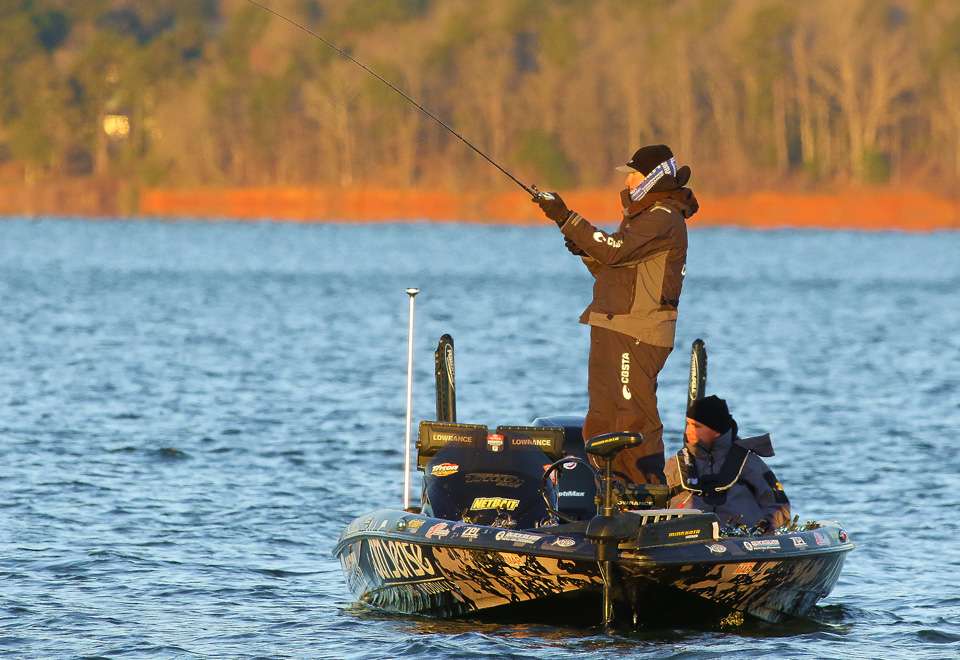
GREENVILLE, S.C. — Lake Hartwell’s blueback herring population could be the dark horse factor coming into play when the competition begins on Friday at the GEICO Bassmaster Classic presented by DICK’S Sporting Goods.
When water temperatures climb into the mid-50s, like they are now on Lake Hartwell, the blueback herring migrate to shallow water to spawn. The predacious bass follow to take advantage of an easy meal. That means the early morning bite will be a factor in this Classic more than ever before.
Fishing a blueback herring bite requires stealth, patience and a firm commitment to time. It can be a boom or bust proposition. Most of all, making the most of the short-lived bite comes down to being in the right place, at the right time. An area might be loaded with herring but the bass must be there too.
Do you gamble the clock and extend the wait time for the bass to arrive? Or do you call it quits and transition to the midmorning and afternoon patterns?
The skies will reveal the answers to those questions with the coming weekend. Low light conditions are ideal. The daylight takeoff and chance of showers on Saturday might prolong the blueback herring bite.
Expect blueback herring to be a buzzword on Bassmaster LIVE with the analysts deep diving into the topic. Until then here is the information that I gathered during the media day on Thursday.
Michael Iaconelli could barely contain himself as I approached his boat with notebook and recorder in hand. Asking a question was unnecessary.
“This is a herring lake and on every single lake like it that I’ve ever fished those fish go into pockets and drains at night,” explained Iaconelli. “On Wednesday I found four such areas and they were loaded.”
The word “loaded” was enunciated deeply, slowly and loudly. Such excitement is not unusual for one of the most passionate anglers in the game. Is Going Ike over the herring bite justified?
Absolutely, said David Walker. Bass are so adaptive to a given lake environment they will favor whatever forage is most plentiful and easy to prey upon. The prolific and fast-growing blueback herring fit the bill on many lakes, including Hartwell.
“Once that happens the bass are forever herring chasers,” he explained. “The only difference is when the bass must go up on the bank and spawn.”
Walker also noted the blueback herring change bass feeding habits and thusly how anglers pattern those fish. Blueback herring infused fisheries make bass move more often to keep up with the nomadic forage.
On Friday morning expect Jacob Wheeler to leave the dock and go into blueback herring mode. The offshore fishing wizard explained the blueback herring are main lake baitfish drawn to shallower water under low light conditions.
“A blue herring bite is more about the movement of the baitfish and how the bass follow them,” added Wheeler. “The herring live in the timber and they move up in the middle of the night and the bass follow.”
The brighter the skies, the shorter the bite lasts. Cast cloudy skies over a lake and the bite goes on longer.
“A blueback herring bite is totally dependable on weather and it has to be perfect for it to go down all day.”
Alton Jones is on the blueback herring bite train with a catch.
“The guys who will rely heavily on the blueback herring bite could reap the rewards of catching bigger bass,” he said. “For the guys who don’t they stand the chance of being more consistent, waiting for prespawn fish to come in and set up on their areas.”
Jones, like his peers, said the golden window of opportunity for the blueback herring bite should be determined by light conditions. That is a risk worth taking, even with the difficult task of keeping up with their movements.
“Baitfish movements often determine how we pattern bass, and that is especially true on lakes with blueback herring,” he said.
That means bass on blueback herring lakes will be more nomadic. Fishing spots is risky business. Keeping up with blueback herring movements is the wiser approach.
Mike McClelland plans to do just that on Hartwell.
“The big key this week will be not getting hung up on where the blueback herring were in practice,” he said. “What’s the better idea is following the birds and paying attention to where the herring should be.”
McClelland hopes to be moving around a lot on Saturday when the cloudy skies might keep the herring bite going the longest during the tournament. So do all his peers who will be in the hunt for the blueback herring bite.

